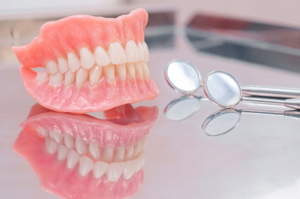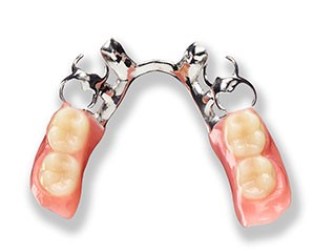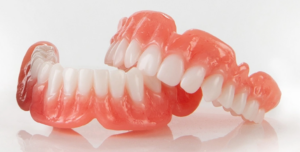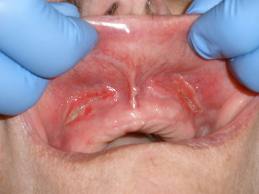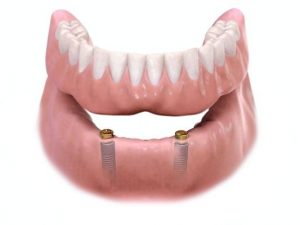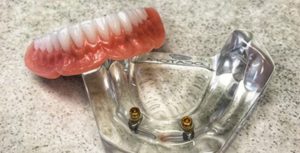
If your denture fit is off, it’s always a sign you should visit your dentist to have them looked at. While many denture wearers may realize this if they are experiencing pain, others may put the visit off.
Often, they’ll look for tips on how to tighten dentures at home or how to make your dentures fit better.
Why does it happen that dentures become loose? How is it that one day they fit and the next you’re wondering if your dentures are too big for your mouth?
There are many different reasons you may be experiencing denture fit problems, including the common issue where dentures feel loose. Let’s go over what may be happening in your situation so we can improve your oral health.
Understanding Dentures
Dentures are artificial teeth and gums designed to replace missing teeth, offering a functional and aesthetic solution for those who have lost their natural teeth. Depending on the number of teeth that need replacing, dentures can be either partial or complete. Partial dentures are used to fill in gaps between remaining natural teeth, ensuring a seamless smile and proper bite alignment. On the other hand, complete dentures replace all the teeth in either the upper or lower jaw, providing a full set of teeth for those who need it.
Typically made from durable acrylic resin, dentures are custom-crafted to fit each individual’s mouth perfectly. This customization ensures that the dentures not only look natural but also feel comfortable and secure. Whether you need partial dentures to complement your existing teeth or complete dentures for a full replacement, these prosthetics are designed to restore your smile and improve your quality of life.
How Should Ill Fitting Dentures Fit In Your Mouth?
Partial Dentures
If you’re wearing partial or complete dentures to fill a gap in your smile or even permanent dentures, then they should fit to stay in line with your natural teeth.
How do you know you have partial dentures problems?
While slight movement may naturally happen, significant movement is a problem.
After the initial period of a few weeks getting used to your partial dentures, you should feel comfortable talking and eating with them in. If they’re moving so much you’re uncomfortable, see your dentist.
Full Dentures
Your full upper dentures should suction to the top of your mouth.
The bottom denture should rest on your gums and bones without significant movement.
If you have a loose lower denture this is very common. Lower denture problems occur from the lack of bone support and the movement of all the muscles of the tongue, lips and cheeks.
To permanently get rid of your loose lower then consider adding two dental implants, also known as snap in dentures. With just 2 implants you will never worry about your denture slipping or moving and you will eat anything you want to. Implant supported dentures offer a more stable and functional alternative to traditional dentures, providing an improved fit and reducing the need for adjustments.
Are your dentures cutting into your gums? Are you experiencing denture pain? See your dentist so you can discuss options.
Causes of Loose Dentures
Loose dentures can be a frustrating issue for many denture wearers, and understanding the causes can help in addressing the problem effectively. One common cause is bone resorption, which occurs when the jawbone deteriorates due to the lack of stimulation from natural tooth roots. This bone loss can lead to dentures feeling loose and unstable over time.
Another factor contributing to loose dentures is wear and tear. Just like any other appliance, dentures are subject to daily use, and over time, this can cause them to wear down and lose their snug fit. Proper care and maintenance are crucial to prolonging the life of your dentures and preventing them from becoming loose.
Poorly fitting dentures are another significant cause of discomfort and looseness. If dentures are not properly adjusted to fit the contours of your mouth, they can move around, causing irritation and difficulty in speaking or eating. Regular visits to a qualified dental professional can help ensure that your dentures are properly fitted and adjusted as needed.
Taking Care Of Your Dentures To Keep Them Fitting Well
Wearing dentures that fit properly is crucial for your oral health. The better you care for your dentures, the better they’ll fit.
This is in part because if you’re rough while handling them, they can break or bend.
A more common problem that leads to loose dentures and partial dentures problems is using things like regular toothpaste to keep your dentures clean.
You want to use denture specific cream to clean your dentures. Why? The substances in toothpaste may be great for natural teeth, but your dentures are made of different materials. Toothpaste is abrasive for dentures and can corrode the material over time.
This leads to improper denture fit, dentures cutting into gums, and denture pain.
How to Make Your Dentures Fit Better?
If you suffer from ill fitting dentures you may be miserable. Fix loose dentures to avoid discomfort and potential health risks. Not being able to smile or eat properly with your teeth can affect patients of all ages.
- Take great care of them over time. Brush the dentures at night and leave them out of your mouth.
- Weekly you can soak them in a denture cleaner.
- Use denture cream if they are loose. A little bit of adhesive will go a long way.
- Have them adjusted by a dentist
- Have the denture relined
Stay away from using the denture adhesive strips on your false teeth. They may feel comfortable but they affect the position of the denture and you will be prone to breaking teeth.
When something feels off with them, visit your dentist! If there is something wrong with them fitting properly, your dentist can adjust the acrylic so it does not rub the gum in that area. To tighten the false teeth against the gums the dentist may need add a liner inside the denture to make them fit tightly again.
The Role of Denture Adhesive
Denture adhesive plays a crucial role in helping denture wearers achieve a more secure and comfortable fit. This product is typically applied to the dentures before they are inserted into the mouth, creating a stronger bond between the dentures and the gums. For individuals experiencing loose dentures, denture adhesive can provide much-needed stability, making it easier to speak, eat, and go about daily activities without worry.
However, it’s important to remember that denture adhesive is not a substitute for proper denture care and maintenance. While it can help improve the fit and comfort of your dentures, it should be used in conjunction with regular cleaning and professional adjustments. Over-reliance on adhesive can mask underlying issues with the fit of your dentures, so always consult with your dentist if you experience persistent problems.
Preventing Loose Dentures
Preventing loose dentures involves a combination of regular care, proper maintenance, and professional oversight. Start by cleaning your dentures daily to remove food particles and plaque, which can cause damage and affect the fit. Use a soft-bristled brush and denture-specific cleaner to avoid abrasive damage.
When not in use, store your dentures in a safe, moist environment to prevent them from drying out and losing their shape. Avoid hard or chewy foods that can cause wear and tear on your dentures, leading to a loose fit over time.
Regular visits to a qualified dental professional are essential for maintaining the fit and function of your dentures. Your dentist can make necessary adjustments, reline your dentures, and provide guidance on proper care. By following these steps, you can help ensure that your dentures remain comfortable and effective, allowing you to enjoy a confident smile and improved oral health.
Your Gums Will Change Over Time
Without natural teeth in your gums, they will become less dense. When your gums change, the denture fit will as well.
Even with natural teeth, your gums naturally change as you age, just like the rest of your body does. It is normal for the gums to become smaller.
If you have had dentures for several years only to wonder “are my dentures too big for my mouth?”, they probably are.
Don’t turn to home remedies. It can be tempting to look for how to tighten dentures at home, but you have invested in your smile with your dentures. Having your dentist reline them is the safest way to keep your dentures in great condition.
Or consider adding dental implants to make them snap on dentures and never use denture adhesives again!
You And Your Dentures Will Change Over Time
Wearing dentures will not last forever. Natural teeth don’t last forever, either. The best you can do is take great care of them so they last longer and visit your dentist regularly to keep your dental health and the state of your denture fit in the best shape possible.
If you ever have questions about your dental care, contact our team to schedule an appointment! We are here for you!
Please select service, date and provider then click on the Find Appointments button.
Please select service, date and provider then click on the Find Appointments button.

